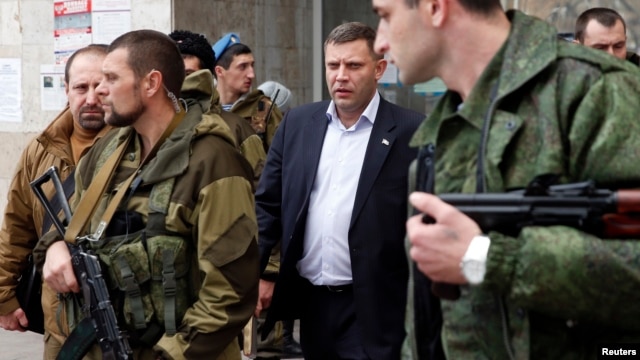A pro-Russian separatist leader in eastern Ukraine has announced a “general mobilization” with the aim of bolstering separatist armed forces to as many as 100,000 fighters.
Alexander Zakharchenko, leader of the self-proclaimed Donetsk People’s Republic, was quoted by the separatist DAN news agency Monday as saying that “the enemy” – meaning the Ukrainian government – is increasing the number of its forces in the southern part of the Donetsk region, “likely for an attack,” and that the mobilization was thus needed to “balance the situation.”
He said the recruitment drive would start in 10 days and initially would seek volunteers.
Zakharchenko said plans call for combining the forces of the Donetsk republic with those in the neighboring self-declared Luhansk People’s Republic, which would total roughly 100,000 fighters.
He also was quoted as saying he hoped the mobilization would make it possible to add at least five additional brigades – one tank, one artillery and three motorized infantry brigades – to the separatist forces by this spring.
He gave no indication where the military hardware to equip these forces would come from. Ukraine and Western governments say Russia has been sending weaponry and personnel into eastern Ukraine to back the separatists, a charge Moscow denies.
US hasn’t decided on lethal aid
Meanwhile, the United States has not decided whether to provide Ukraine with lethal military assistance in its fight against the separatists, a State Department spokeswoman said Monday following a New York Times report that such aid was being considered.
Spokeswoman Jen Psaki told reporters at the department’s daily briefing that there is an “ongoing discussion” but that no decisions had been made. The Times reported Sunday that the Obama administration is taking a “fresh look” at the question of military aid.
In December, Obama signed legislation authorizing $350 million in lethal and nonlethal military aid to Kyiv.
But a White House spokesman at the time said the president had misgivings about delivering such hardware – a move that many analysts said would be viewed by Russia as a major Western military provocation.
Psaki on Monday said Washington is particularly concerned about “escalating separatist violence” and the rebels’ attempts to expand the territory they control beyond the cease-fire line agreed to last September in Minsk, Belarus. Fighting has raged in the Donetsk and Luhansk regions, especially around the Ukrainian-controlled town of Debaltseve, since peace talks in Belarus between Ukraine’s government and the separatists collapsed on Saturday.
“Naturally, we take into account events on the ground and events that are ongoing,” Psaki said.
Intent on diplomatic, political solutions
She said that the focus remains finding a political and diplomatic solution and that the U.S. and its Western allies have no interest in engaging in a proxy war with Russia.
“Our objective here is to change the behavior of Russia,” Psaki said. “That’s the reason why we’ve put the sanctions in place.”
Economic sanctions remain the preferred tool for altering that behavior, Ben Rhodes, deputy White House national security adviser, told CNN later on Monday.

“We still think that the best way to influence Russia’s calculus is through those economic sanctions that are biting deep into the Russian economy,” Rhodes said in an interview with the news channel. “We don’t think the answer to the crisis in Ukraine is simply to inject more weapons.”
In addition to sanctions, the U.S. has provided more than $118 million in training and nonlethal assistance to help Ukraine.

![[VIDEO] Drag Queen Drag Shows Are Now Infesting Churches](https://christianjournal.net/wp-content/uploads/2019/11/Screenshot-2019-11-22-at-9.02.01-PM-218x150.png)
![[VIDEO] Starbucks Worker Dumps Milkshake On Open Air Preachers Head](https://christianjournal.net/wp-content/uploads/2019/11/Screenshot-2019-11-22-at-7.23.43-PM-218x150.png)
![[VIDEO] Man Arrested For Threatening To Kill Female Abolitionist With Crowbar](https://christianjournal.net/wp-content/uploads/2019/11/MLock-1-218x150.jpg)
![[VIDEO] Drag Queen Drag Shows Are Now Infesting Churches](https://christianjournal.net/wp-content/uploads/2019/11/Screenshot-2019-11-22-at-9.02.01-PM-100x70.png)
![[VIDEO] Starbucks Worker Dumps Milkshake On Open Air Preachers Head](https://christianjournal.net/wp-content/uploads/2019/11/Screenshot-2019-11-22-at-7.23.43-PM-100x70.png)
![[VIDEO] Man Arrested For Threatening To Kill Female Abolitionist With Crowbar](https://christianjournal.net/wp-content/uploads/2019/11/MLock-1-100x70.jpg)


